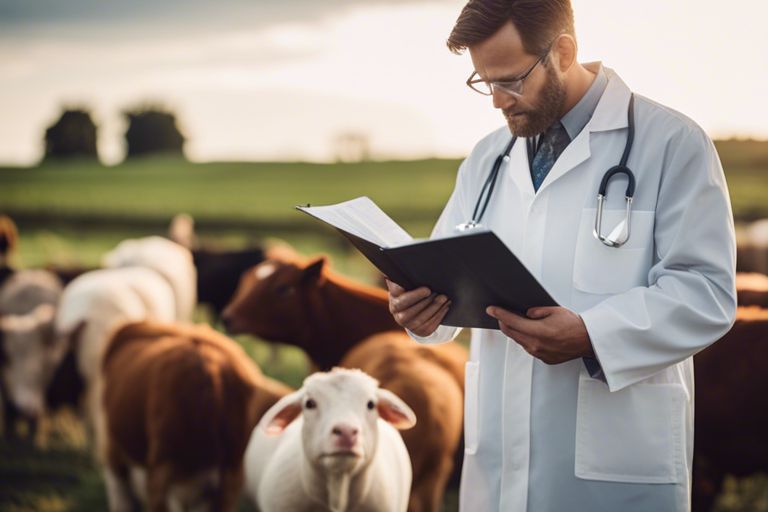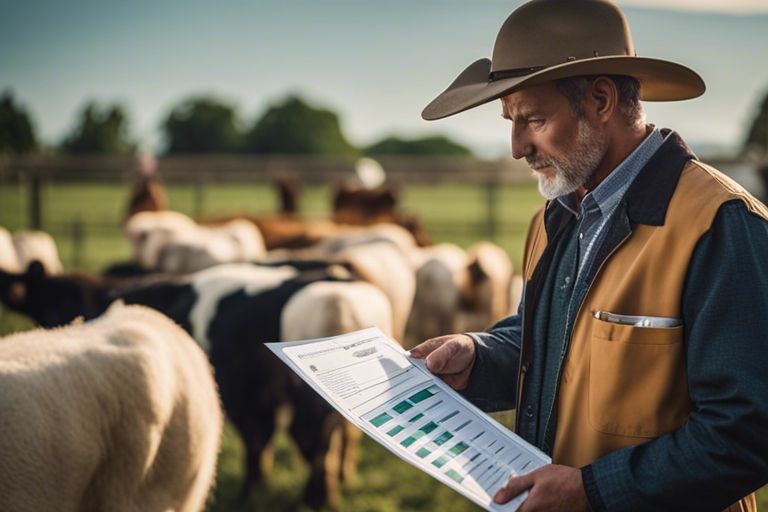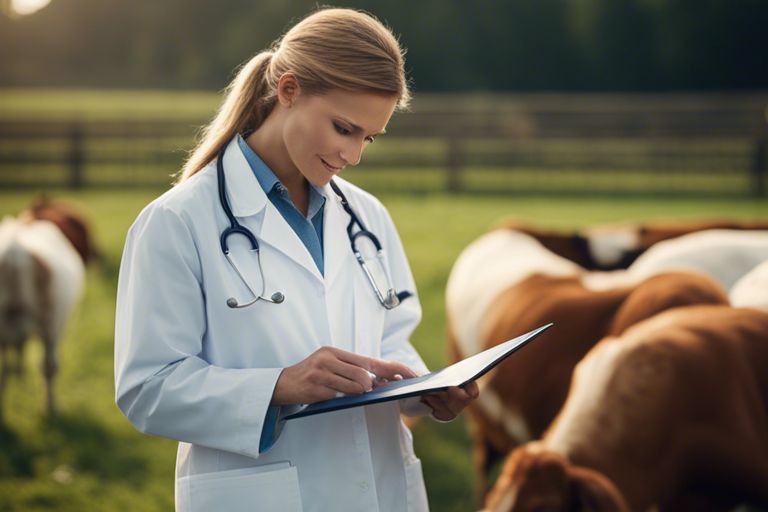Many livestock owners may encounter challenges related to nutrient deficiencies in their animals, which can adversely affect their health and productivity. Recognizing the signs of these deficiencies is crucial for ensuring the well-being of your livestock. In this comprehensive guide, we will discuss how to identify common nutrient deficiencies in livestock, the importance of proper nutrition, and effective strategies for addressing these issues. By understanding the key indicators and implementing appropriate solutions, you can proactively manage and improve the nutritional status of your livestock.

Recognizing the Signs of Nutrient Deficiencies
Visual Indicators and Behavioral Clues
One of the key ways to identify nutrient deficiencies in livestock is by observing visual indicators and behavioral clues. Pay attention to changes in coat condition, such as dullness or hair loss, as well as any abnormal behavior like decreased appetite or lethargy. These signs can indicate a lack of vital nutrients in their diet, prompting the need for further investigation.
The Role of Monitoring and Record-Keeping
To effectively address and prevent nutrient deficiencies in livestock, it is crucial to implement a systematic monitoring and record-keeping system. Keep detailed records of feed composition, animal weight, and any observed symptoms. Regularly monitor feed intake, body condition, and growth rates to identify any deviations from the norm, allowing for timely intervention.
Understanding the trends and patterns recorded in your monitoring system can help pinpoint the underlying causes of nutrient deficiencies. By analyzing the data over time, you can make informed decisions about adjusting feed formulations, supplementing with specific nutrients, or improving overall management practices to ensure optimal livestock health and productivity.

Common Nutrient Deficiencies and Their Symptoms
Macronutrient Deficiencies: Proteins, Fats, and Carbohydrates
Little can disrupt the health and productivity of livestock like macronutrient deficiencies. Common signs of protein deficiency include poor growth, reduced milk production, and decreased immune function. Fat deficiencies may lead to a dull coat, reproductive issues, and reduced energy levels. Carbohydrate deficiencies can result in weight loss, lethargy, and decreased milk production. Ensuring a balanced diet rich in proteins, fats, and carbohydrates is imperative for the overall well-being of your livestock.
Micronutrient Deficiencies: Vitamins and Minerals
Assuming proper macronutrient levels are met, micronutrient deficiencies can still impact livestock health. Common signs of vitamin deficiencies include poor coat quality, decreased reproductive performance, and weakened immune systems. Mineral deficiencies may manifest as weak bones, muscle tremors, and poor growth rates. Regular monitoring of vitamin and mineral levels, as well as supplementation when necessary, is crucial for preventing these issues.
Vitamins play a crucial role in various bodily functions of livestock. They are imperative for the growth, metabolism, reproduction, and immunity of animals. Deficiencies in vitamins can result in a range of health issues, impacting the overall performance and well-being of livestock. Ensuring adequate intake of vitamins through a balanced diet or supplementation is key to preventing deficiencies and promoting optimal health in your animals.

Factors Contributing to Nutrient Deficiencies
Not all nutrient deficiencies in livestock are solely due to inadequate diets. Several factors can contribute to the development of nutrient deficiencies in animals. It is important to consider these factors when identifying and addressing deficiencies in livestock.
Dietary Imbalances and Poor Feed Quality
Factors such as imbalances in the diet and poor feed quality can lead to nutrient deficiencies in livestock. Inadequate levels of important nutrients in feed can result in deficiencies that affect the overall health and productivity of animals. To prevent deficiencies related to dietary imbalances and poor feed quality, it is crucial to ensure that animals are receiving a well-balanced diet that meets their nutritional requirements.
Environmental and Genetic Factors
One of the contributing factors to nutrient deficiencies in livestock is environmental and genetic influences. Environmental factors such as soil quality, climate, and access to clean water can impact the absorption and utilization of nutrients in animals. Genetic factors, including breed differences and individual animal variations, can also play a role in nutrient deficiencies. It is important to consider these factors when evaluating the overall health and nutritional status of livestock.
- Through proper management practices and genetic selection, these factors can be mitigated to reduce the risk of nutrient deficiencies in livestock. Note, a holistic approach is key to addressing and preventing nutrient deficiencies in animals.
How-To Address Nutrient Deficiencies
Tips for Correcting Diets and Supplementing Nutrients
After identifying nutrient deficiencies in your livestock, it’s crucial to take action to address the issue. One effective way to correct diets and supplement nutrients is by working with a livestock nutritionist. They can help you formulate a balanced diet tailored to your animal’s specific needs and recommend the right supplements to fill any nutrient gaps.
- Consult a livestock nutritionist to create a balanced diet.
- Consider supplementing with minerals and vitamins as needed.
- Regularly monitor your livestock’s condition and adjust the diet accordingly.
Knowing the exact nutrient requirements of your livestock is necessary for maintaining their health and productivity. By correctly addressing nutrient deficiencies, you can ensure that your animals thrive and reach their full potential.
Improving Feed Efficiency and Management Practices
Even with a well-balanced diet, improving feed efficiency and management practices is key to maximizing nutrient absorption and utilization in your livestock. Proper feed management, such as ensuring access to clean water at all times and using high-quality feed, can enhance nutrient uptake and overall health in animals.
Nutrient absorption and utilization can also be improved by implementing feeding schedules and reducing feed wastage. Additionally, regular monitoring of your livestock’s feed intake and behavior can help identify any issues early on and prevent nutrient deficiencies from occurring.
Prevention Strategies and Long-Term Health
Developing a Balanced Feeding Program
Program: All livestock owners must prioritize developing a balanced feeding program to prevent nutrient deficiencies in their animals. This involves providing a diet that meets the specific nutritional requirements of each species and life stage. Consult with a qualified animal nutritionist to create a customized feeding plan that includes a mix of high-quality forages, grains, and supplements.
Regular Health Assessments and Veterinary Check-ups
To ensure the long-term health of your livestock, regular health assessments and veterinary check-ups are vital. Plus, schedule routine vaccinations, deworming, and hoof trimming to keep your animals healthy and free from common diseases. Engage with a trusted veterinarian who can provide guidance on preventative healthcare measures and spot any potential nutrient deficiencies early on.
Conclusion
Summing up, identifying and addressing nutrient deficiencies in livestock is crucial for their health and productivity. By regularly monitoring their diet, consulting with a veterinarian or nutritionist, and performing necessary tests, farmers can ensure that their animals receive the proper nutrients they need. Implementing proper feeding strategies and adjusting diets accordingly can prevent deficiencies and promote overall well-being in livestock. It is important for livestock owners to stay vigilant and proactive in managing nutrient deficiencies to ensure the health and success of their animals.
FAQ
Q: What are nutrient deficiencies in livestock?
A: Nutrient deficiencies in livestock occur when animals do not receive adequate amounts of necessary nutrients such as vitamins, minerals, and proteins necessary for their growth, health, and reproduction.
Q: How can I identify nutrient deficiencies in livestock?
A: Nutrient deficiencies in livestock can be identified through various symptoms such as poor growth, weight loss, reduced milk production, dull hair coat, weak immune system, and reproductive issues.
Q: What are the common nutrient deficiencies in livestock?
A: Common nutrient deficiencies in livestock include deficiencies in vitamins (such as vitamin A, D, and E), minerals (such as calcium, phosphorus, and selenium), and proteins.
Q: How can I address nutrient deficiencies in livestock?
A: To address nutrient deficiencies in livestock, it is important to provide a balanced diet that meets their specific nutritional requirements. This may involve supplementing their feed with missing nutrients or changing their diet to include more nutrient-rich foods.
Q: How can I prevent nutrient deficiencies in livestock?
A: To prevent nutrient deficiencies in livestock, ensure they have access to high-quality feed, clean water, and mineral supplements. Regularly monitor their health and adjust their diet as needed to meet their changing nutritional needs.
Q: Should I consult a veterinarian for addressing nutrient deficiencies in livestock?
A: Yes, it is recommended to consult a veterinarian if you suspect nutrient deficiencies in your livestock. A veterinarian can perform tests to identify specific deficiencies and provide guidance on the best course of action to address them.
Q: What are the consequences of untreated nutrient deficiencies in livestock?
A: Untreated nutrient deficiencies in livestock can lead to serious health issues, reduced productivity, lower reproductive rates, and even death. It is important to address nutrient deficiencies promptly to ensure the well-being of your livestock.











